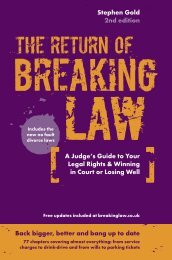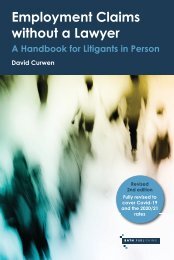Insolvency Made Clear: A Guide for Debtors
Plain English, practical guidance for anyone facing demands over a debt they are struggling to pay.
Plain English, practical guidance for anyone facing demands over a debt they are struggling to pay.
You also want an ePaper? Increase the reach of your titles
YUMPU automatically turns print PDFs into web optimized ePapers that Google loves.
<strong>Insolvency</strong> Law <strong>Made</strong> <strong>Clear</strong> – A <strong>Guide</strong> For <strong>Debtors</strong><br />
A ‘company voluntary arrangement’ (CVA) is the <strong>for</strong>mal process which, if 75%<br />
of creditors agree, can lead to the debt of a company being reduced or the company<br />
being given more time to pay.<br />
‘Corporate’ is an adjective, and it means ‘of a company’.<br />
‘Costs’ refer to the lawyers’ fees, court fees and other fees to bring or defend a claim.<br />
The ‘court’ is a polite way of referring to the judge who is in charge of making<br />
decisions in a case.<br />
‘Credit rating agencies’ are companies which assess how likely it is that someone<br />
can af<strong>for</strong>d to repay a debt. They work behind the scenes. Professional lenders<br />
will almost certainly check an individual’s credit rating with an agency be<strong>for</strong>e<br />
agreeing to a loan.<br />
A ‘creditor’ is someone who is owed a debt. For example, if a bank makes a loan<br />
to an individual the bank will be a creditor.<br />
A ‘creditors’ voluntary arrangement’ (CVA) is a process where creditors agree to<br />
restructure the debts of an insolvent company. See Chapter 12.<br />
A ‘debt relief order’ (DRO) is a type of streamlined bankruptcy which only applies<br />
<strong>for</strong> debtors who have few assets and small debts.<br />
A ‘debtor’ is someone who owes a debt.<br />
To ‘default’ on a loan is not to repay it on time.<br />
A ‘directions hearing’ is a court hearing which aims to make orders about the<br />
conduct of the case rather than to determine its outcome. For example, it might<br />
set a timetable <strong>for</strong> the exchange of evidence.<br />
‘Directors’ are those individuals who are responsible <strong>for</strong> running a company in<br />
the eyes of the law. They do not need to have the job title ‘director’, and they are<br />
(or should be) listed in Companies House. Some but not everyone who has the<br />
title ‘director’ is a director <strong>for</strong> the purposes of this book: only those with a particular<br />
legal role with the company are directors. The rest are senior employees<br />
of the company.<br />
The ‘discharge’ of bankruptcy is when the bankruptcy order ends.<br />
A company is ‘dissolved’ after the process of liquidation is finished: it is struck<br />
off the list of companies in Companies House. Whatever assets remain become<br />
the property of the Queen (‘bona vacantia’).<br />
xxii













